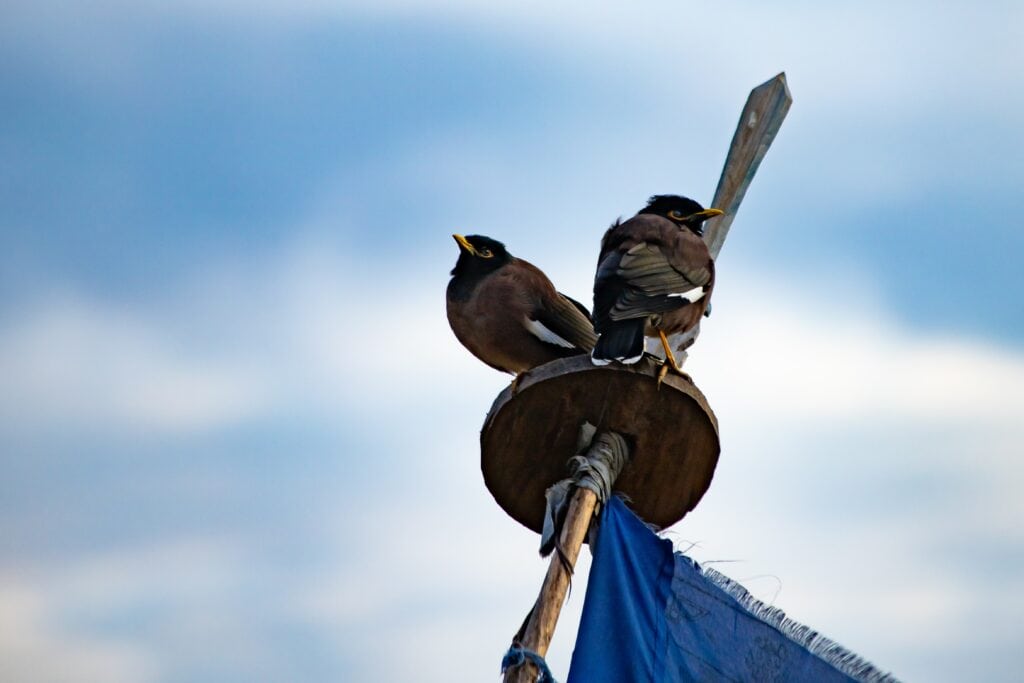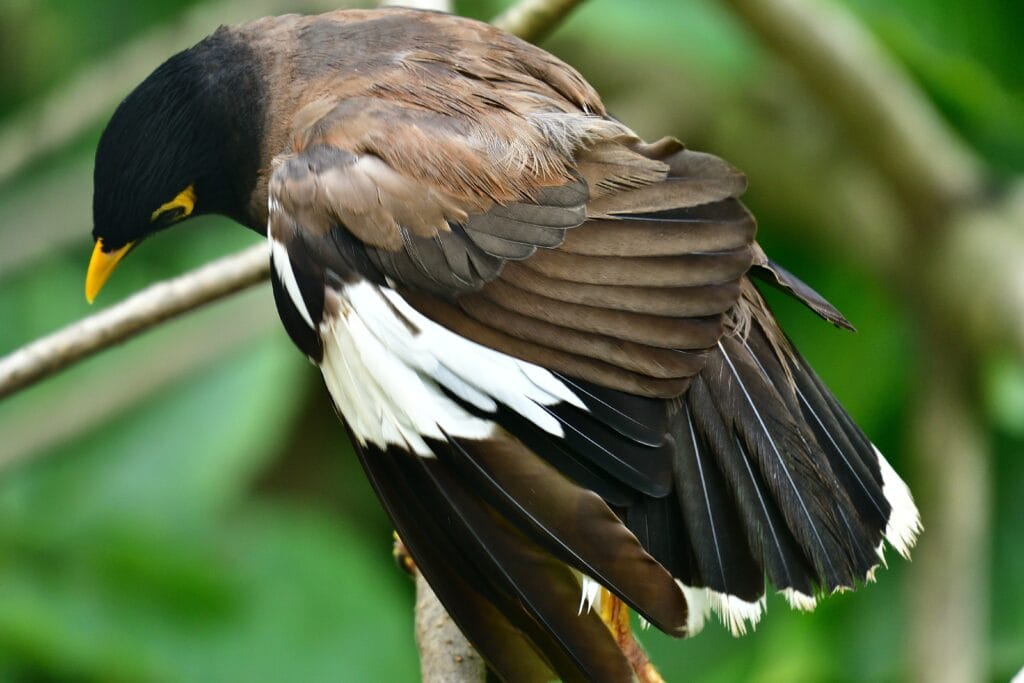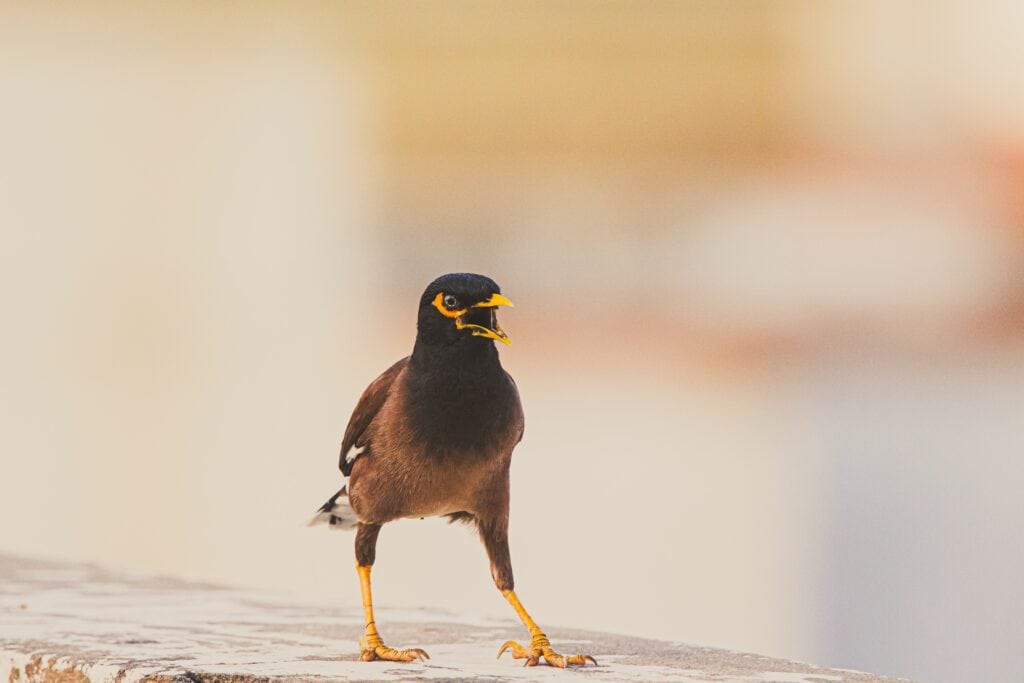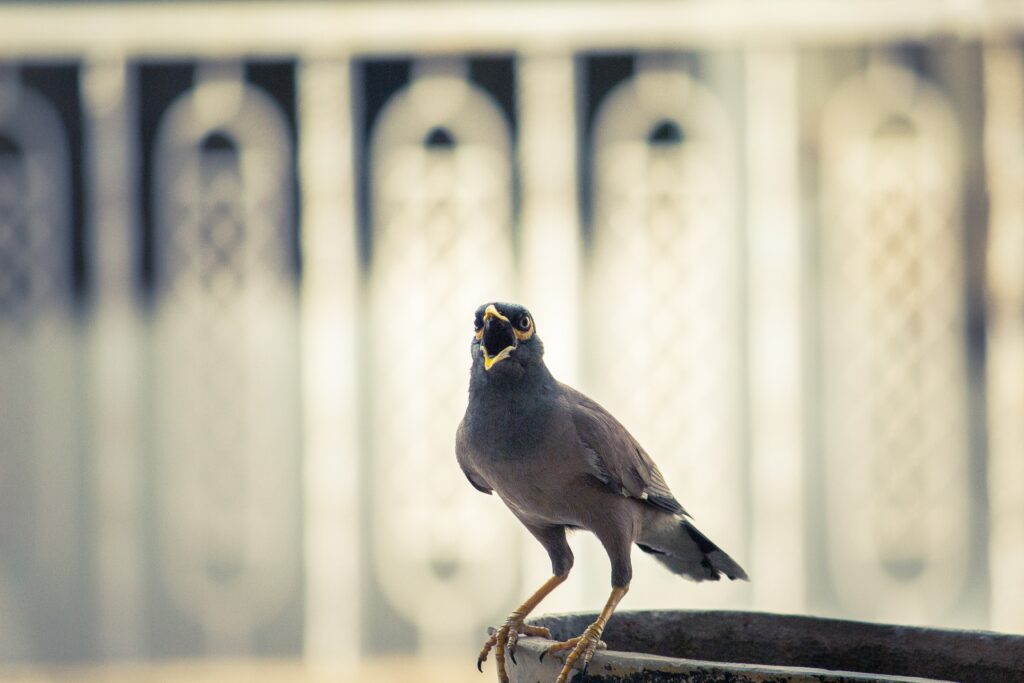Myna birds, also spelled “Mynah,” are members of the starling family found in southern Asia. The Myna bird is best known for its popularity as a pet thanks to its impressive ability to mimic sounds. Mynas can mimic human speech, complex songs, and a range of man-made noises.
The Myna is a smart, beautiful, and interesting bird. Unfortunately, the Myna has a complex relationship with conservation and ecology around the globe. The distinctive Bali Myna is one of earth’s most critically endangered birds, with less than one hundred wild individuals estimated in 2018. On the other hand, the Common Myna is one of only three birds listed on the IUCN’s list of the one hundred most detrimental invasive species. The Common Myna is native to Asia but has spread through introduced populations into Australia, New Zealand, South Africa, and significant portions of Europe and the United States. In stark contrast to the struggle to maintain dwindling Bali Myna populations, the Common Myna is responsible for out-competing native species and is considered to be a major nuisance to architecture and agriculture. It remains a popular pet despite this invasive status. (1)
Myna Symbolism and Meaning
Myna birds symbolize memory, intelligence, imitation, and communication. The Myna’s impressive repertoire makes it one of the most popular and accomplished “talking birds” in the world. Some even consider the Myna’s speaking ability to be on par with that of the parrot. (2)
Mynas are monogamous birds which form pairs, perform courtship rituals, and defend their territories fiercely. Both Myna parents incubate their eggs and care for the resultant offspring. Mynas, then, can represent romance, protection, relationships, and families. (3)
In parts of the world, the Myna bird is treated as the subject of this popular nursery rhyme:
“One for sorrow,
Two for joy,
Three for a girl,
Four for a boy,
Five for silver,
Six for gold,
Seven for a secret never to be told”

Another older version of the rhyme reads as follows:
“One for sorrow,
Two for mirth
Three for a funeral,
Four for birth
Five for heaven
Six for hell
Seven for the devil, his own self”
This rhyme typically refers to Magpies. In India, though, it is applied to Myna birds. For this reason, encountering a single Myna bird is seen as a bad omen which brings misfortune. People who encounter single Mynas may even wait until a second Myna bird appears. Because the rhyme states “one for sorrow” and “two for joy,” encountering two Myna birds is thought to bring good luck, happiness, and potential romance. (4)
Because of this rhyme, groups of Myna birds may be associated with various different outcomes. A Myna flock can be seen as predicting one’s fortune due to its numbers.
Myna birds are dangerously invasive in parts of the world. They pose such a threat because they are extremely adaptable and capable of making homes for themselves in urban environments. Mynas have the dubious distinction of being one of the birds, like Rock Doves, who are frequently referred to as “winged rats” by their detractors. Invasive Mynas are a major ecological issue. There is no disputing this fact. However it is difficult not to admire the flexibility, grit, and determination that the Myna displays. Myna birds are survivors which adapt to whatever circumstances are thrown at them. The cruel irony of the entire matter is that despite this fighting spirit, the Bali Myna is disappearing all whilst its more common invasive cousins continue to dominate ecosystems. Mynas may represent perseverance, adaptability, conservation, ecology, invasion, pestilence, or nuisances.
Myna Native American Symbolism
Mynas are not native to the Americas. The closest equivalent that we can examine would likely be the Mockingbird. Mockingbirds appear in Native American cultures in a wide variety of different forms. Various sources state that many tribes associate these birds with intelligence. Such sources even include accounts of traditions wherein the heads or hearts of mockingbirds would be fed to young children with the expectation that this would make the children grow up to be clever. (5)
Myna Christianity Symbolism
The scientific name of the Common Hill Myna, one of the most popular pet species and accomplished mimics, is “Gracula religiosa.” This stems from the practice of using the Myna’s extensive mimicry abilities to teach this bird to recite short snippets of prayers. For this reason, the Myna bird can be connected with prayer and faith. Prayer is obviously a major and significant aspect of Christian religious practices.
“And when you pray, do not be like the hypocrites, for they love to pray standing in the synagogues and on the street corners to be seen by others. Truly I tell you, they have received their reward in full. But when you pray, go into your room, close the door and pray to your Father, who is unseen. Then your Father, who sees what is done in secret, will reward you. And when you pray, do not keep on babbling like pagans, for they think they will be heard because of their many words. Do not be like them, for your Father knows what you need before you ask him.”
— Matthew 6:5-8 (6)
Myna Celtic Symbolism
Mynas are not naturally occurring in Europe, but Celtic mythology does include a lot of meaningful songbirds. The Myna might be connected, for example, with the birds of Rhiannon. Rhiannon is an important goddess who embodies queenship, otherworldliness, and feminine power. Rhiannon entertains visitors to the realm of the supernatural by allowing her choir of songbirds to sing for them. This song of Rhiannon’s birds is said to be so enchanting that the listener is liable to forget themselves and listen for centuries without noticing that the time has passed. (7)
Myna in Dreams
Dreaming of a Myna bird may indicate communication. A Myna bird dream can relate to feeling the need to speak up and be heard. Don’t hold back from expressing your true thoughts and feelings.
A Myna bird appearing in one’s dream may also indicate that the dreamer feels forced to mimic others or “blend in” in order to feel comfortable. It is often said that Mynas mimic other sounds because they lack a song of their own. This isn’t exactly true, but a Myna dream can still be a great reminder to get comfortable with standing out. Being yourself is important even if it makes you feel vulnerable.

Dreaming of a lone Myna may indicate dread or anxiety. This is due to the Myna usurping the Magpie’s role in the “one for sorrow, two for joy” rhyme. A lone Myna may indicate isolation and loneliness as well.
Myna Encounters and Omens
As discussed in the previous section, encountering various quantities of Myna birds may tie in to the “one for sorrow, two for joy” nursery rhyme. With this in mind, encountering a lone Myna is thought to bring misfortune. Two Mynas are thought to signify good luck and romance. Three Myna birds are thought to signify a future daughter. Four Mynas are thought to predict a future son. Further Mynas are typically looked at as foretelling wealth and financial success.
Encountering an invasive Myna bird in a region where these birds are non-native can refer to pests and invasion. Despite this, encountering a Myna in an urban setting can refer to tenacity or adaptability.
An encounter with a pet Myna may relate to feeling trapped or stuck in one’s routines. Pet Myna birds can be happy and comfortable with proper care and exercise. Such an encounter can be a reminder to cultivate the things that make you happy in order to feel more free.
Myna in Mythology & Folklore
Besides the nursery rhyme which we have discussed extensively in the above sections, Myna birds do not frequently appear in mythological traditions. Regardless, I will summarize what I have found concerning Myna myths and folklore.
Laotian Mythology:
According to a Laotian myth, there was once a bird which was revered for its ability to speak. This bird could speak human languages and form new sentences all on its own. Because of this, the bird was a common and sought-after pet. One day, a man stole his neighbor’s cow and skinned it and hid the meat amongst his rice storage. The next day, the neighbor came to the man and asked him if he had seen his cow. The bird perked up and said “he has killed and eaten your cow. Its meat is with the rice storage.” The neighbor could not decide who to believe and the bird and the two men had to go to court to sort out the matter. The night before they went to court, the man covered the lid of the bird’s cage with a pot and poured water over the pot and beat it with a spoon.

The next day, when the judge questioned the bird, the man told the judge that it could not be trusted. He warned the judge that the bird would lie if it was asked what the previous night had been like. The judge asked the bird and the bird described rain and storms. It had been a clear night, so the bird was not believed. The bird was cast from the man’s household. In the woods one day, the bird saw a parrot and a Myna approaching the village. They were speaking human language. The bird approached them and warned that mankind did not treat talking birds kindly, especially when they told the truth. This is the reason that parrots and Myna birds only mimic what we say and do not speak to us with their own thoughts. (8)
Hindu Mythology:
“Myna” comes from a Hindu word meaning “delightful” or “joyful.” I could not verify this completely, but some sources indicate that this name, in turn, comes from an older Sanskrit word meaning “messenger of God.” (9)
Myna Spirit Animal
If the Myna is your spirit animal then you are likely extroverted and communicative. People with the Myna spirit animal enjoy conversing with others and may feel uncomfortable being alone for long stretches. The Myna spirit is prone to loneliness.
People who have the Myna as their spirit animal tend to be intelligent and quick-witted. For the Myna spirit, pleasing others is a major motivation. Much of the Myna spirit’s wit is used to entertain others and make them laugh.
The Myna spirit animal enjoys puzzles and challenges. Learning new things is incredibly stimulating and satisfying for the Myna spirit.
Myna Totem Animal
If your totem animal is the Myna then you are likely an individual who can adapt to any situation. People with the Myna as their totem animal are brave and tenacious. The Myna totem is fantastic at making the best of difficult circumstances.

People with the Myna as their totem animal are absolute optimists. They do not allow difficult situations to rain on their parades. The Myna can always find the silver lining no matter how dark the cloud may be.
Myna Power Animal
The power of the Myna bird is foresight. People with the Myna power animal have an uncanny ability to predict the sequence of events that will follow their choices. This is far from infallible, but this advanced foresight does help the Myna power animal to determine the most fortuitous path.
Myna Tattoo Meaning
A Myna tattoo may represent intelligence, curiosity, communication, or domesticity. For somebody from South Asia, a single Myna tattoo is likely to represent misfortune. Multiple Mynas may represent more positive ideas.
Because Mynas are sometimes taught to “pray,” a Myna tattoo may represent faith or focus.
Conclusion
Myna birds are both exceptionally beautiful and endlessly fascinating. It is not often that a non-parrot breaks into the ranks of popular pet birds which talk and mimic. While there are certainly settings in which Mynas are detrimental, the widespread appeal of these birds makes it obvious that they are too charming not to love!
